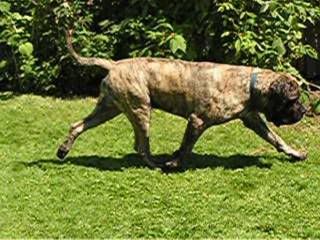i live in montana and have fed wild game to my mastiffs for the past four years. i probably can answer just about any question you have about it, as i questioned the fish and game people very closely about these issues.
first off, you should get yourself a copy of "give your dog a bone" by ian billinghurst. he goes into quite a bit of depth about feeding wild game.
first of all, freezing at -20 degrees centigrade for at least ten days is essential. it kills the tapeworm cysts. while it is true that dogs in the wild eat these, those dogs don't have owners. and the dog WILL transmit tapeworm to you if you don't kill the cysts before feeding. it can be very dangerous.
second, never ever ever feed any part of the digestive system to the dogs. this means from the trachea on down to the anus. this is where the more developed tapeworms live, and they may be harder to completely kill.
third, never feed wild mountain lion or bear to dogs. they carry trichinosis.
third, chronic wasting disease does not jump species. you can safely feed wild game even if there is cwd in your area.
fourth,
wild game is not an easier alternative to buying at the supermarket. it is a huge amount of work.
however, the food quality of wild game is far higher than anything you can get at the supermarket, so it is well worth it.
if you can, feed whole prey model: i.e., feed chunks of meat, bone, with skin and fur still attached, that is the best. the fur helps smooth the way through the intestines, and helps prevent punctures from bones. whole heads are great! the nose, tongue, eyes, and brains are the delicacies they go for first.
ok, fifth, don't feed any weight supporting bones, like leg bones. raw bones do not splinter, but these harder bones can break your dogs' teeth. only feed cartilegenous bones, like necks, backs, ribs.
like i said, this is ten times the work of buying at the supermarket or butcher. if you want to save time and energy, develop a good relationship with just one or two suppliers, buy in bulk, watch for sales, and order up all your stuff by the case lot, all at once. if you have a large chest freezer it makes the job a lot easier. it will pay for itself very soon with your savings from buying in bulk.
make friends with your suppliers and they'll call you on the days stuff expires and they were just going to throw it away. my dogs get by most of the year on case lots of pork necks, turkey necks, whole chickens, beef hearts, and the occasional special on beef ribs. i never spend more than .99 cents/lb. i average about .60/.lb. the meat department prewraps everything for me in one-day portions so all i have to do when i get home is toss it in the freezer. i place an order for everything i need about once a month, go down to the supermarket, haul it out to the car, toss it in the freezer in the garage, and i'm done. all i have to do then is remember to take it out far enough ahead to defrost.
when i get wild game, i have to go to the meat processors with a carload of empty plastic yogurt tubs, thick rubber gloves, and some black plastic lawn and leaf bags to haul off heads and rib cages. sifting through bins of scrap wild game meat and packing it in tubs is not fun, let me tell you. it's a huge amount of work, time consuming and politically difficult, because i am dependent on the good will of the owner of the plant and his workers. they aren't allowed to sell this stuff, and i am in the way.
make certain you freeze all wild game at least ten days at 20 below zero C. mark the tubs with the date you packed so you'll be sure.

working Mastiff
 Previous Topic
Previous Topic Index
Index Next Topic
Next Topic











 Top
Top

.jpg)


